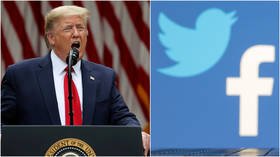Dem-GOP divide is a myth. When it comes to true tyranny, Big Tech-style, Congress easily agrees to throw the people under the bus
At a time when the politicians in Washington can’t seem to agree on anything, Congress has given us a rare dose of bipartisan consensus by voting overwhelmingly to approve the National Defense Authorization Act (NDAA).
Tuesday’s 335-78 House vote approving the $731 billion bill was so bipartisan, in fact, that it’s veto-proof. President Donald Trump has vowed to veto the legislation, but if the Senate can come together with as much unity as demonstrated by the House, Congress will be able to override this temporary departure from "norms" in the executive branch.
The underlying consensus is this: The billionaires are still in charge, and all that talk about free speech and the Constitution is just noise to deceive the masses. We don’t want to hear any uprisings from below, so know your place, and speak within the boundaries of polite, globalist-approved discourse.
Also on rt.com YouTube says it will DELETE videos claiming 2020 election was fraudulentThat’s because Trump demanded that the NDAA include a repeal of Section 230 liability protections that the government has provided to social media companies. Under Section 230, Facebook, Twitter and other Big Tech platforms aren’t legally liable for the content posted on their sites.
The theory is that these platforms are akin to the public square, where people have a free exchange of ideas, so it doesn’t make sense for the utility-like builders of virtual gazebos and fountains to be held financially responsible for damages caused by the speakers. But when the companies curate the content, increasingly censoring what can be said, they deserve to be held just as accountable for their material as any other publisher.
Big Tech’s immense power has been wielded to great effect, and not for the public good. Consider Google, the world’s biggest controller of information in the English language. The tech titans were troubled by Hillary Clinton’s unexpected loss to Trump in the 2016 election. Google co-founder Sergey Brin, speaking at a meeting of executives after the 2016 defeat, called on the company to find ways to ensure a “better quality of governance and decision-making.”
We saw that vengeance play out in 2020, as social-media censors worked overtime to deliver their kind of governance. The veracity of news posted online was judged by one guiding principle: If it made Democrat candidate Joe Biden look bad, such as the New York Post’s scoops about his family’s alleged influence-peddling in Ukraine and China, it was deemed disinformation and blocked. If it made Trump look bad, even if based on illegally leaked documents or sketchy anonymous sourcing, it was golden.
Antitrust lawsuits against the tech companies, such as cases announced on Wednesday in which the Federal Trade Commission and attorneys general from 48 US states and territories are suing Facebook, won’t address the problem. Their focus is the anti-competitive business practices of the tech giants, not the suppression of speech.
Also on rt.com Facebook faces TWO antitrust lawsuits, as FTC and 48 US states & territories mount parallel challengesRepublicans in Congress talked a good game about fighting the censorship. Tech executives such as Facebook’s Mark Zuckerberg and Twitter’s Jack Dorsey were summoned to Washington for Senate hearings. There were a few uncomfortable questions and even suggestions that social media censorship was election interference, as it was.
But as we saw on Tuesday, the hearings were just another episode of the left-right theater that we often see in America. It’s like we saw with illegal immigration. Republicans lamented for years and years with their most enthusiastic voters that the country was being harmed by porous borders, but when Trump took office in 2017 and had GOP majorities in both houses of Congress for two years, the vows were forgotten. A border wall didn’t get funded, and legislation that would sharply cut the flow of illegal aliens wasn’t even pursued by lawmakers.
Also on rt.com US Department of Justice launches probe into Hunter Biden's ‘tax affairs’ amid calls for ‘special counsel’The Rs and the Ds are meaningless. We often get diversionary, made-up issues like transgender restrooms to paint a picture of warring political parties. But when it comes to the things that really matter, like our Constitutional freedoms, consensus is suddenly found. Everyone who occupies the halls of power -- from the Republicans and the Democrats to Silicon Valley and Wall Street to the globalist billionaires and their media mouthpieces -- agrees. The ruling class will do whatever it wants, and the rest of us aren't in their club.
Like this story? Share it with a friend!
The statements, views and opinions expressed in this column are solely those of the author and do not necessarily represent those of RT.
















